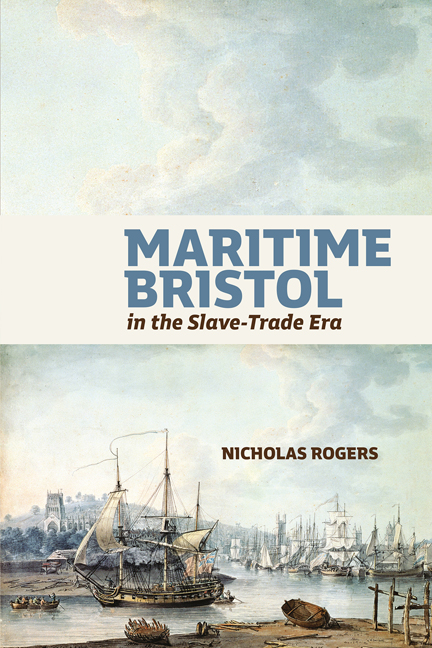Book contents
- Frontmatter
- Dedication
- Contents
- List of Figures
- Acknowledgments
- List of Abbreviations
- Introduction: High Tides, Atlantic Waters
- 1 The Pilots of Pill
- 2 The Hazards of the Bristol Slave Trade
- 3 Slave-ship Sociology
- 4 The Unfortunate Shipwright, or, the Trials of Robert Barker
- 5 Mutiny and Murder on Bristol’s Long-haul Ships, 1720–70
- 6 Bristol Privateering in the Mid-eighteenth Century
- 7 The Impressment of James Caton, 1779
- 8 New York in Bristol: the Crugers
- 9 The Politics of Abolition in Late Eighteenth-century Bristol
- Bibliography
- Index
8 - New York in Bristol: the Crugers
Published online by Cambridge University Press: 08 May 2024
- Frontmatter
- Dedication
- Contents
- List of Figures
- Acknowledgments
- List of Abbreviations
- Introduction: High Tides, Atlantic Waters
- 1 The Pilots of Pill
- 2 The Hazards of the Bristol Slave Trade
- 3 Slave-ship Sociology
- 4 The Unfortunate Shipwright, or, the Trials of Robert Barker
- 5 Mutiny and Murder on Bristol’s Long-haul Ships, 1720–70
- 6 Bristol Privateering in the Mid-eighteenth Century
- 7 The Impressment of James Caton, 1779
- 8 New York in Bristol: the Crugers
- 9 The Politics of Abolition in Late Eighteenth-century Bristol
- Bibliography
- Index
Summary
Henry Cruger is usually remembered as Edmund Burke's radical sidekick, his colleague as MP for Bristol from 1774 to 1780, a tumultuous half-decade when Britain went to war with its American colonies. Although he had stronger links with Bristol than Burke – he had been a common councilman since 1766 and became an alderman in 17821 – it has always been Burke who has stolen the limelight. This has been snobbery on Bristol's part; the pleasure of being represented by a well-known national politician and writer. In the centre of Bristol to this day stands a statue of Burke. Cruger's memory is tucked away on a small plaque off Park Street where the merchant-politician once lived.
The plaque reveals several things. Cruger had a long life, dying at the age of 87 in 1827. He was an American, but lived for thirty-three years in Bristol, becoming mayor of Bristol in 1781 and joining the elite Society of Merchant Venturers that dominated the commercial and political life of the city. Henry Cruger was also a transatlantic figure. He was one of three American-born members to sit in eighteenth-century British parliaments; he actually contested four elections and sat twice for Bristol, in 1774 and again in 1784. But in April 1790, two months before the next general election, when parliament was still in session, he left for New York and two years later became a state senator there. That made him rather unique, especially as objections were raised to his American heritage when he ran in Bristol in 1784, and to his British links when he ran in New York.
Cruger's decision to return to New York was related to the impact of the American war on his economic circumstances, but there is no doubting the strength of his roots there. He hailed from a merchant dynasty that had prospered in New York and was active in its politics. His grandfather Jan Cruger, very likely of Dutch descent, arrived in New York in 1696 and established a shipping business in association with Onzeel Van Swieton. The partnership survived some early legal challenges including one from Abraham De Peyster, a leading figure in New York.
- Type
- Chapter
- Information
- Maritime Bristol in the Slave-Trade Era , pp. 174 - 197Publisher: Boydell & BrewerPrint publication year: 2024

